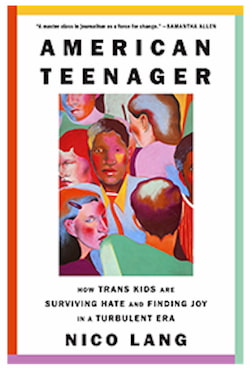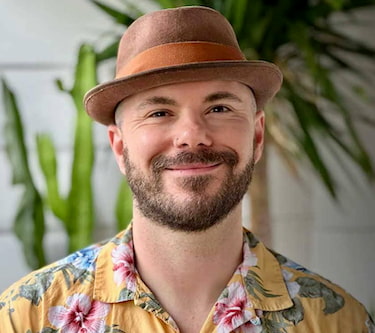“Their story is about finding each other, about the ways in which they are messy and imperfect and unfailingly generous toward one another as a balm for the world’s cruelty.”
That’s what author Nico Lang says about the family of trans’ teenage boy Wyatt early in their book American Teenager. Published in 2024, the book is about Wyatt and seven other trans, nonbinary, or genderfluid young people, from Chicago to Texas and Florida. Channeled through Lang, these stories are all about family, acceptance and community.

Family would affirm their trans’ son ‘a million times over’
Lang brings a humorous and sharp filter to help these kids share their stories, starting with Wyatt’s.
Wyatt’s family lost their church community and many of their social ties when they openly supported their son after he came out at 10 years old in Sioux Falls, S.D. But the family itself pulled together even more, instead of letting the challenge tear them apart.
Wyatt’s parents told Lang they would make the same decision for their son “a million times over.” Wyatt himself said it taught him to balance his desires, with possible reactions to them.
Some of the other teenagers are like Wyatt and have supportive or activist parents. Others have one parent, and little other outside support. As teenagers, all are discovering what connection means to them.
They’re also considering where they’ll go once they find connection, including far from home. For example, Mykah, a black, genderfluid theatre kid from Charleston, W. Va., dreams of New York as a place to be open and uplift them.
This is resonating because LGBTQ+ people are twice as likely than the general population to be estranged from their born family.
Each teenager crafts community from the supportive and sympathetic around them, such as camp or school. Three of them found joy and popularity through Magic City Acceptance Academy, a queer-affirming area charter school in Birmingham, Ala.
What struck me most is how real and complex all the teens’ lives are, through Lang’s filter. These are not just stories just of marginalization, perseverance, and family struggles, bitter disappointment, depression and isolation. They worry about friends and crushes, too. There’s also lots of queer joy and connection, and these teens are often energetic, precocious and defiant young people.

Nico Lang, author of ‘American Teenager’ (photo courtesy Christian Rogers)
Intersectional identity a key part of American Teenager
American Teenager is an honest and often heartwarming dive into overlooked, intersecting identities. It also respects not only gender, but also race, class, and geography. Most of the teens come from conservative or rural areas where queerness is either ignored or under threat, something I am concerned with as a rural gay man myself.
The level of nuance Lang offers is rare in queer media; it’s a touching and relatable breath of fresh air. The teenagers are not perfect or sanitized, but are never maligned. One great example is Kylie Yamamoto. Lang mentions her guiltless self-confidence and pampered nature, but also talks later about her uncertain direction in life, connection with her mother, and exasperation with transphobic “old” politicians.
We also see illustration of how politics, rhetoric and discrimination wear on the teens. This is something that will connect with many people from marginalized communities.
Several of the teens expressed hopelessness, loneliness from bigotry, and a sense of looming danger; Lang mentioned the Shappleys in their introduction, a family they interviewed in 2021 and were not in this book as they moved from Florida to Connecticut over “anti-trans” legislation.
Some of the teens in American Teenager, like Wyatt and Mykah, respond to bigotry through activism. Wyatt wants to be a lawyer or politician; Mykah gets involved with a local queer camp and the West Virginia Black Pride Foundation.
Others, like Clint from Chicago, distance themselves from politics and lead “normal” lives. “… Clint prefers to be unseen: to live his life without explanation or correction, to not have to constantly fight to assert his right to live as himself… that others know him not as a transgender boy but simply as a boy.”
This common humanity is too often overlooked in the weeds of activism, political discussion, and statistics that are rightfully important to us as queer people. This is a look at the people behind politics.
“I hope that you laugh with [the kids], you cry with them,” Lang writes in their introduction. “That you share in their hopes and desires; that you can learn something about yourself in their thoughts and their words.”
I saw myself and my own experiences peering back at me from this book, and I did cry with the teens at their joys and pitfalls while remembering my own.
Lang traveled around the country and lived alongside these families for nine months to see their daily lives, and to learn the thoughts and feelings of the teens and their loved ones. They are now on a book tour to promote American Teenager, and have visited over 100 cities to participate in book talks.
I don’t think I can recommend this book enough. It’s a chance to stop and reflect and see the young people affected by politics. That’s rare and powerful today.
Readers will feel a sense of urgency about “anti-trans” legislation — but also hope, perseverance and self-discovery. Through Lang, these kids who are now young adults show us what they have to offer, and how to push through.
Nico Lang is a nonbinary journalist and the founder of Queer New Daily. Formerly deputy editor for Out magazine and LGBTQ+ correspondent for VICE, their work has appeared in Rolling Stone, Esquire, the New York Times, Vox, the Wall Street Journal, Salon, Harper’s Bazaar, Time, The Washington Post, and the L.A. Times. They have won a GLAAD Media Award, 10 awards from the National Association of LGBTQ Journalists (NLGJA). Lang was also the first recipient of the Visibility Award from the Transgender Legal Defense and Education Fund. This is their first book.
American Teenager is available on Amazon, Audible, Barnes and Noble.

